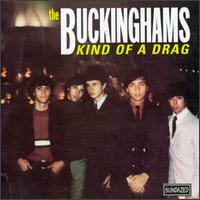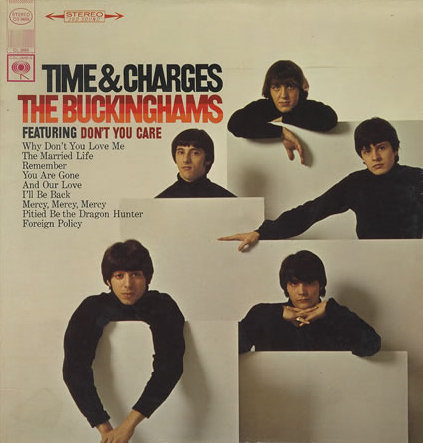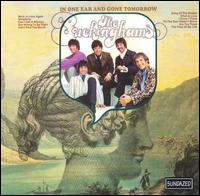The Buckinghams
Albums reviewed on this page: Kind of
a Drag, Time and Changes,
In
One Ear and Gone Tomorrow.
The Buckinghams were pop superstars for
about a year
and a half in 1967-68, and then a trumped up drug charge and popular
abandonment of wistful pop derailed them. Yes, "wistful"
best describes their music - their biggest hits are full of teenage love and accompanying lack of
understanding. Nowadays, the Buckinghams are big-time
uncool, but their songs are soul-shaded Chicago pop-rock at it's AM radio
finest, and the foundation of the "Chicago Sound" (aka
taking a pop-rock track and plastering horns all over it).
They
also suffered from what I like to call the Chicago Curse - starting
out as a well-intentioned Chicago cover band and ending up as pop
drool. Their early success with "Kind of a Drag"
allowed them to sign with a big label, but then they started working
with manager/producer James
William
Guercio. Guercio may have gotten them a contract
with
Columbia, but he also steered them in an awful pop direction,
drowning the band in horns and strings and giving them crappy songs
to record. The group managed to survive a while, but after
cranking out three albums in two years, they faded along with other
happier pop groups. They were always a bit more soul-oriented
than other pop groups such as The New Colony Six, thanks mainly to
Dennis Tufano's strong vocals and Jon-Jon Poulous's interesting drumming.
Frankly, they were never that good - I can't image a greatest hits
compilation getting more than a ***1/2
rating - but they are a guilty pleasure.
Tufano & Giammarese had a duo in the 1970s and
Grebb went on to play with Chicago related bands like Lovecraft and The
Fabulous Rhinestones.
Personnel:
Nick Fortuna
(bass), Carl Giamarese (lead guitar, vocals), Dennis
Miccolis (organ), Jon-Jon Poulos (drums),
Dennis Tufano
(vocals). Miccolis was fired after Kind
of a Drag,
and replaced with Marty Grebb (keyboards).
 Kind
of a Drag (1967), **1/2
Kind
of a Drag (1967), **1/2
An overly generous rating, but this album is pretty fun.
The Buckinghams were still a real rock band at this point; a cover
band to be sure, but still a band. The
title track was the big hit, as producer Dan Belloc added punchy horn
parts to the tune about confused teenagers, kicking off the "Chicago
Sound" in the process. As a result, horns showed up
everywhere in Chicago bands, not always for the best. After
the title track's success, the label just slapped every Buckinghams
track it had around onto one LP in an effort to get product out the
door. Such is the nature of a #1 nationwide hit. Thus, some
of
these tracks were released as singles as far back as 1965. Kind of a Drag's
parentage is probably a
combination of their live act and whatever songs they were
given.
Thus, there is a heavy British Invasion influence --some Kinks-y
fuzz-rock ("Don't Want to Cry", "I've Been Wrong
Before"), a tame Beatles cover ("I Call Your Name"),
and from the Zombies as
well ("You
Make Me Feel Good" and a more swinging rendition of Gershwin's
"Summertime"). The band had some talent to get the
job done: guitarist Carl
Giamarese has some throw-away fuzz solos, Dennis Tufano's a good
straight pop singer and Jon-Jon Poulous does a good job at the kit. Kind of a Drag also
has some soul feel along with the
Brittania, as Tufano does a good job pulling off James Brown's "I'll
Go Crazy," but the rest of the album is just period filler.
Local guitarist and songwriter Jim Holvay contributed three songs
("Love Ain't Enough" with partner Gary Beisbier, "Makin'
Up and Breakin' Up", the title track), all in the same sort of
teenage love vein, but the two non-hits are not as good.
Nothing significant about this album beyond historical realms, but
just a fun time. Released on a small label, and with an
appropriately out-of-focus cover photo of the band. Produced
by
Belloc and the group's manager.
 Time
and
Changes (1967), *1/2
Time
and
Changes (1967), *1/2
The
tracks on this album fall into two discrete categories - up-tempo
numbers like their debut (Holvay and Beisbier's "Don't You Care"
and "Why Don't You Love Me" which have the same confused
teenage motif, and a cover of Cannonball Adderly's "Mercy,
Mercy, Mercy"), and a pile of schlocky James William Guercio
originals which comprise the remainder (the lone exception is the
Beatles' "I'll Be Back"). Guercio was now their
producer, manager and arranger, and his strategy was to push them
more towards a bland, mainstream pop sound. Thus, Giamarese was
handed an acoustic guitar, and was shunted to the background along
with new keyboardist Marty Grebb. Guercio was smart
enough not to mess with the Buckingham's recipe for success (both
"Don't You Care" and "Mercy, Mercy, Mercy" were
Top 10 hits), but his horn and string arrangements are disturbingly
overblown. If you thought Days of Future Passed
or The
Left Banke were florid, these arrangements approach
self-parody.
Guercio's own songs are the same sort of dated fluff that he was
working on with the milquetoast Chad & Jeremy, and stuffed with
hideous romantic clichés and bad rhymes. His work has
only a small nod towards contemporary musical trends with "Foreign
Policy," a Socially Conscious piece with the usually clunky
arrangement, a JFK excerpt in the middle and then some backwards
horns at the end. It is as awkward as my
description.
Tufano's voice is suited to this sort of thing, but his heart isn't
in it (he sounds bored on "You Are Gone"). Poulous
keeps banging away as usual - he was probably one of the best
pop-rock drummers at this point. Guercio's songs are so
embarrassing, the comparison with the rest of the album is like night
and day, and they drag my rating way way down.
Portraits
(1968)
Guercio
was still in charge, but the band wrote most of the material.
Holvay and Beisbier's
"Hey Baby (They're
Playing Our Song)" and
"Susan" were big
hits.
 In
One Ear and Gone Tomorrow (1968), **
In
One Ear and Gone Tomorrow (1968), **
The
Buckinghams had freed themselves from Guercio and consequently moved
in more adventurous directions, as their brand of clean collar
pop-rock was becoming fast outdated. Yes, the band explored
new
territory, but it was only new territory for them. In One
Ear has a pile of songs that sound like second-rate tunes
from
other bands, either Love's orchestrated and acoustic dreams (the
hushed "Simplicity"), or Paul Revere and the Raiders pop
("Till the Sun", "Are You There", "The Time
of My Life"). Some sound like a deliberate attempt to
break with their earlier sound (the country-rock attempt at humor
"Our Right to Be Wrong" with phony vocals and massive
amounts of slide guitar). Psychedelia only gets a few passing
nods (the hazy, contemplative "I Know I Think" written by
Grebb and Poulous, and the lame opening to "Song of the
Breeze"). Giamarese did get to solo, but he does not show
any of the exuberance displayed on their debut (the distorted guitars
on "I Can't Find the Words" are a frustratingly missed
opportunity). Still, In
One Ear has plenty of "regular"
Buckinghams materials, even though they had run out of Holvay/Bieber
songs. Guercio's last work is here (Grebb's bluesy "What
Is Love"), but even with Guercio gone, Grebb and arranger Sam
Andrews know how to put major 7th chords, and horn and string
arrangements together to copy the Buckingham's finer moments (the
intro to "Back in Love Again" sounds eerily like Chicago).
Their pre-Guercio style shows up only intermittently, such as on the
fun soul flashback "Can I Get a Witness?". Still, the
band, or really Grebb (who wrote or co-wrote with other members
nearly every tune) knows how to write some good material, and "I
Can't Find the Words" boasts a good sing-along chorus. In
One Ear produced no hits, and is inconsistent, but the Buckinghams
made their own mistakes, and not Guercio's. Produced by Jimmy
"the Wiz" Wizner.
They
were
asking for trouble with a album title like that, though.
Tufano & Giammerese (1973)
The guitarist and singer had a duo which released three
albums in the 1970s. I have not heard them, and I don't think
they had anywhere near the level of popularity as The Buckinghams.
 Kind
of a Drag (1967), **1/2
Kind
of a Drag (1967), **1/2
 In
One Ear and Gone Tomorrow (1968), **
In
One Ear and Gone Tomorrow (1968), **